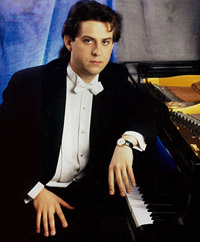SB Symphony Presents Concerto By Andre Mathieu
Prize-Winining Quebecois Pianist Alain Lefevre Will Play Rescued Mathieu Work
Alain Lefevre is on a mission, and his efforts have just won him not only a big award, but also a big break, as this weekend the Santa Barbara Symphony under the baton of Nir Kabaretti will present him in the west coast premiere of an unusually powerful Romantic piano concerto by the French-Canadian composer Andre Mathieu. The concerto, Mathieu’s 4th, was never properly performed or recorded during the composer’s lifetime, and was reconstructed from some solo acetates that were given to Alain Lefevre by friends of Mathieu. Mathieu, who was born in 1929 in Montreal, and died at the age of 38, was a child prodigy who many consider the greatest Canadian composer. I spoke with Lefevre about his win, the concerto, Mathieu, and the Santa Barbara Symphony by phone last week. The concerts, which are at the Granada, are on Saturday and Sunday, January 23 and 24.

Congratulations on your recent good news. Could you explain the Personnalité de l’année award?
Yes, it was presented by the député de Bourge, Maka Kotto, and there are several categories, including business, courage, journalism, and the prize that I won, which is given for advancing the arts. The jury is made up of the chancellors from the universities in Quebec, so the whole thing is conducted on a critical rather than a popular basis. They take a cold hard look at one’s accomplishments when deciding this, so it is quite an honor, and it is in particular recognition of my work with the legacy of the great composer Andre Mathieu.
How did you receive the news that you had won?
I watched the announcements on live television, and before I heard my name, they cued up the music, and that’s when I knew, because it was my recording of the Mathieu Concerto No. 4. So there were tears in my eyes as soon as the music began to play.
How long have you been interested in the work of Mathieu?
It’s been twenty years now. It started for me with his Concerto No. 2, which is very beautiful, and something I have enjoyed playing very much. But people’s view of this work has been affected by the fact that Mathieu was a child prodigy. It can be hard for them to accept that a child could have composed music of this much drama. He was a modern Mozart, and even surpassed him in some ways, at least as a prodigy.
How did this project to recover and record the Concerto No. 4 come about?
When I started out trying to do this I had to go ahead without much support. There was no full score or really much of anything on paper. Mathieu at the end of his life was a big drinker, the kind who would pay his bar tabs with sheet music. He’d tell the bartender, “keep this, it will be worth a lot of money.” So obviously, when he died, his papers were in disarray. But one night when I was performing the Mathieu Concerto No. 3 with an orchestra in Quebec, a woman asked the stage manager if she could speak to me privately. She was about 70, she was with her husband, and they came to the green room where I was and handed me a bag, saying, “you should have this.” And I’m thinking “what is it?” Well, it was a set of acetates that Mathieu had recorded of himself playing the solos from his Concerto No. 4. They had been recorded haphazardly in people’s homes, they were not in great shape, and I didn’t even have a machine that could play them. Fortunately I had friends with great technical resources who could make copies for me. When I heard them, I knew I had to get a score. There was no score, so I hired a man to make a transcription, and then Gilles Bellarmare finished the job of reconstructing the piece for performance.
How would you describe the concerto?
It is a great gift to Canadian music, because it is our link to Romanticism. Most Canadian composers have been modern, but Mathieu was, in Paris, a friend and peer of Sergei Rachmaninoff, and their music is very similar. When it came time to record it, I wanted to do it with an American orchestra, because I felt that the Canadian orchestras had been sleeping on this, and I wanted to give them a wake up call. I went to Tucson, where George Hanson is, and he and the Tucson Symphony Orchestra did an amazing job with recording it, along with some other works by Mathieu. Soon there will also be a biography of the composer, and even a film about him. It’s a very exciting time for me. I believe in the quality of this music very much.
And what about in terms of how it sounds?
Think of Edvard Grieg or even George Gershwin—but even more traditionally Romantic. His own country cruelly abandoned Mathieu, and it was only in New York that he found acceptance. That’s where his music was heard, and where his career got promoted. The orchestra in Santa Barbara will love playing this music. It’s difficult, but it is grand, and this premiere is going to be a big bang.



